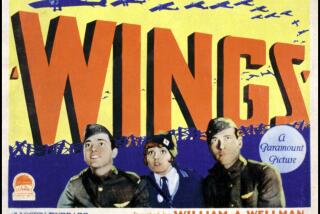DUNK DEBUNKING
Contrary to legend, Alfred Hitchcock did not behave like a “sadist” toward Kim Novak while filming her jump into San Francisco Bay for “Vertigo,” as was reported by Kenneth Turan (“Still a Dizzying Experience,” Oct. 13). The script supervisor’s daily reports on the filming, preserved among Hitchcock’s papers at the Academy of Motion Picture Arts and Sciences’ Margaret Herrick Library, throw cold water on Turan’s claim that Hitchcock took “revenge” on Novak by “insisting on multiple retakes (one estimate is 24) of a scene that called for Novak being dunked in a studio tank.”
The location work for the jump into the bay was done at Fort Point on Oct. 4, 1957, with a double doing the jump for Novak. The matching shot in a studio tank on Dec. 17 required only four takes from Novak and James Stewart. According to the notes by script supervisor Peggy Robertson, the first take was no good because of a problem with Stewart’s hair; the second because he paused on his dive; and the third because of an incorrect match with the way he lifted her in the location footage.
At least on that particular day, Hitchcock did not treat his actors like cattle.
JOSEPH McBRIDE
Los Angeles
*
The scene in question was accomplished in just four takes (with two cameras running simultaneously), which took fewer than 45 minutes to complete. Perhaps this explains why Miss Novak “apparently didn’t hold a grudge.”
It’s interesting to note Hitchcock’s own complicity in the promulgation of this myth. In a 1976 interview with biographer Donald Spoto, he “delighted in remembering that he asked for multiple retakes” of the scene, supposedly for the pleasure he derived from “throw[ing] her [Novak] into the water.”
A couple of minor notes: The usual translation of the Boileau-Narcejac novel on which the film was based (“D’entre les Morts”) is the richly evocative “From Among the Dead” rather than the silly-sounding and meaningless “Between the Dead.” And the critic who described “Vertigo” as one of the cinema’s “four or five most profound and beautiful films,” far before it was fashionable to do so, was not Michael Wood but Robin Wood.
HOWARD H. PROUTY
Sherman Oaks
*
Bernard Herrmann’s score for “Vertigo” is so right that it’s puzzling to come across his opinion that James Stewart was wrong for the film. Just as Herrmann’s music emotionally charges this strangely haunting story, so too does Stewart’s performance.
Perhaps the fact that Stewart wasn’t essentially a romantic actor is what gives his portrayal its effective basis. His Scottie Ferguson is a study in the anguish and confusion of a disturbed man, with his acrophobia symbolizing his increasingly neurotic obsession with the Kim Novak character. It’s a masterpiece of film acting.
TONY THOMAS
Burbank
*
Turan spends a lot of time talking about how present-day audiences will take the film. He obviously has not seen it with a “civilian” (non-auteurist film critic) audience.
The film was run last year at the State Theatre downtown in “The Last Remaining Seats” series. The audience had come prepared to adore the film and were with it for a while, but Hitchcock and his writers’ total lack of interest in their leading lady killed off the audience interest.
Maybe the critics and filmgoers of 1958 were right about “Vertigo.”
TOM STEMPEL
Los Angeles
More to Read
Only good movies
Get the Indie Focus newsletter, Mark Olsen's weekly guide to the world of cinema.
You may occasionally receive promotional content from the Los Angeles Times.








